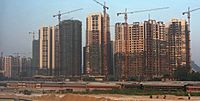
Photo from wikipedia
Land-use and land cover changes may have important local, regional, and global climatic impacts by modifying the underlying land surface conditions, which in turn influence the exchange of energy and… Click to show full abstract
Land-use and land cover changes may have important local, regional, and global climatic impacts by modifying the underlying land surface conditions, which in turn influence the exchange of energy and moisture between the land surface and atmosphere. Many studies have shown that urbanization has contributed to climate warming, and the amount of warming has varied. As the capital of China and one of the world’s megacities, Beijing has experienced rapid urbanization over the past 30 years. In this study, we quantitatively investigated the impacts of urbanization on regional temperatures based on observations from meteorological stations and National Centers for Environmental Prediction (NCEP) reanalysis data and overestimating of the impacts were found. Comparing the temperature trends of land-use types, forest showed stronger inhibitory effects on temperature increase (−0.085°C/10a). Cropland also had a negative effect on climate warming yearly and seasonally, especially in winter (−1.133°C/10a) and spring (−0.299°C/10a). Conversely, the urban area showed strong warming effects (0.438°C/10a). The conversion of cropland to urban land appeared to show the highest warming trend (0.548°C/10a). However, the cooling effect of forest and grassland with high vegetation coverage inhibited climatic warming attributed to rapid urbanization. In addition, planting trees or grass along roadsides and increasing green parks and green roofs can also suppress surface warming. Therefore, the actual warming effects of urbanization on temperatures were overestimated in megacities or urban agglomeration regions. The results showed that the green space and landscape configuration should be considered in urban planning to increase green space and reduce the influence of urban heat island effect.
Journal Title: Advances in Meteorology
Year Published: 2019
Link to full text (if available)
Share on Social Media: Sign Up to like & get
recommendations!